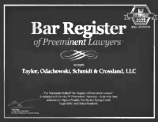5 Common Myths Debunked for Small Business Owners
From misconceptions about deductions and credits to the belief that only large corporations face audits, many facets of taxes can confuse small business owners. Fortunately, by understanding these myths, small business owners can confidently approach tax planning and compliance. Some common myths to watch out for include:
1. MYTH: SMALL BUSINESSES ARE NOT ELIGIBLE FOR SIGNIFICANT TAX DEDUCTIONS
Contrary to the belief that only large corporations benefit from substantial tax deductions, small businesses have access to a variety of deductions that can significantly reduce their taxable income as well. From business expenses and home office deductions to qualified business income deductions, understanding and leveraging these opportunities is essential for maximizing tax benefits.
2. MYTH: ONLY LARGE CORPORATIONS FACE IRS AUDITS
The idea that small businesses are immune to IRS audits is a common misconception. Small businesses, like their larger counterparts, can be subject to audits. However, maintaining accurate and transparent financial records, complying with tax regulations, and seeking professional guidance can reduce the likelihood of an audit and ensure a smoother process if one does occur.
3. MYTH: HIRING FAMILY MEMBERS IS NOT LEGITIMATE FOR TAX SAVINGS
Hiring family members does offer legitimate tax-saving opportunities for small businesses. Business owners may be eligible for various tax benefits by employing family members, including salary deductions and potential retirement plan contributions. However, it’s crucial to ensure that the family members are genuinely providing services to the business and that their compensation is reasonable.
4. MYTH: ALL BUSINESS EXPENSES ARE DEDUCTIBLE
While many business expenses are deductible, not all expenditures qualify for tax deductions. Small business owners should familiarize themselves with the IRS guidelines regarding deductible expenses and keep accurate records to substantiate their claims. Additionally, personal expenses, even if related to the business owner’s activities, may not be deductible.
5. MYTH: FILING AN EXTENSION RAISES THE RISK OF AN AUDIT
Filing a tax extension, when necessary, does not increase the risk of an IRS audit. Extensions provide additional time for small business owners to gather necessary documentation and ensure accurate filings. However, meeting the extended deadline is crucial to avoid penalties and interest.
Taylor Odachowski Schmidt & Crossland, LLC understands the unique challenges faced by small businesses in managing their taxes. Our experienced team of lawyers is dedicated to providing tailored guidance to help small business owners know their rights.
Contact Our Experienced Business Litigation Lawyers Today
Debunking misconceptions empowers small business owners to make informed decisions, optimize tax positions, and confidently navigate taxation’s complexities. The Taylor Odachowski Schmidt & Crossland, LLC team offers personalized insights and strategic solutions to ensure your small business thrives.
For small business owners seeking to understand their tax responsibilities and secure expert guidance, we are here to help. Contact our experienced team today to benefit from our deep understanding of small business taxation law. We are committed to empowering your business with the knowledge and strategic support needed to overcome tax challenges and achieve lasting success. Contact our firm to schedule a consultation through our contact form or call us at (912) 622-6297.



